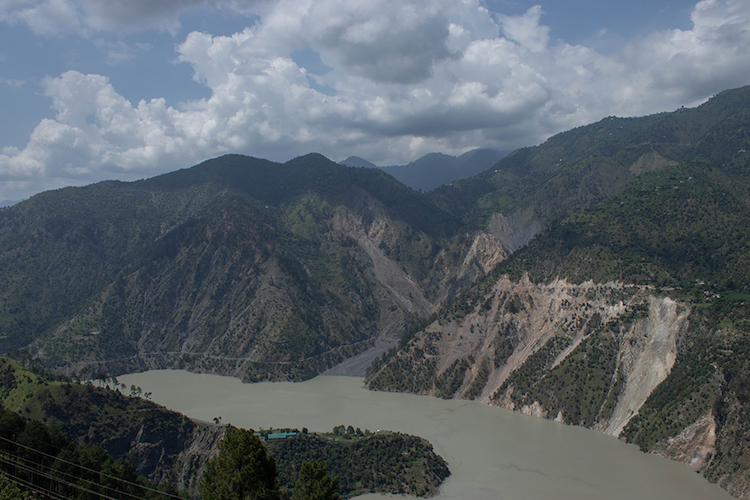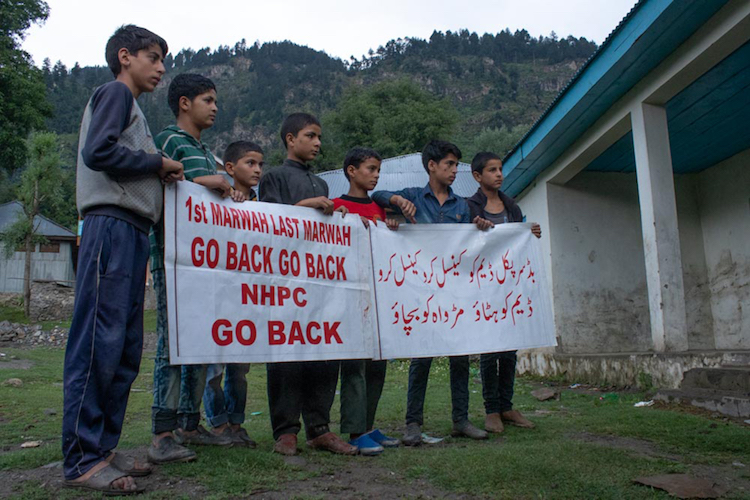Growing Opposition To Dam On Chenab Tributary

In Kishtwar, the Save Marwah Movement stiffens struggle against building of Bursar dam, writes Raqib Hameed Naik for thethirdpole.net
Until 2017, 28-year-old Sheikh Zafar was one among thousands of Kashmiri youths aspiring to make it through the qualifying exams for the Kashmir Administrative Services, the (then) state level civil service. Then, one cold morning in December, he received a frantic phone call from a friend, informing him about the clearance given by India’s Ministry of Environment, Forests and Climate Change to construct a big dam in Marwah tehsil (sub-division) of Kishtwar district. The 800 MW Bursar hydroelectric power project was originally approved in 2000 through an agreement signed between the then Jammu & Kashmir government and India’s Ministry of Power. It was planned on Marusudar, a tributary of the Chenab River. Chenab is one of the three western rivers of the transboundary Indus basin and under the 1960 India-Pakistan Indus Waters Treaty, its waters are reserved for Pakistan, though upstream India can build dams in the basin as long as it does not reduce the water flowing to Pakistan. The Indian government had ensured that the Bursar project would not violate the treaty. But while the international issues might have been taken care of, for people like Zafar, the nod given by the environment ministry meant an assault on the lives and livelihoods of the people living along the banks of the Marusudar. Within weeks, he decided – against the wishes of his parents – to discontinue his preparations for the civil services examination. He moved to Chinjer, a village in Marwah, to make people aware people of the disadvantages of constructing such a dam. “It was a very hard decision,” recalls Zafar, one of the few from the neglected area who had been studied in Aligarh Muslim University, Uttar Pradesh. “But I couldn’t afford to let my people suffer and that gave me the strength to return.” Locals protest the construction of Bursar dam [image by: Raqib Hameed Naik]
Home to nearly 35,000 people, Marwah is one of the remotest parts of Jammu & Kashmir. Tarred roads, mobile connectivity, electricity connections or other basic amenities are luxuries. Horses and ponies remain the primary mode of transport; with candles and kerosene lamps the primary sources of lighting.
There had been some protests against the dam construction plan before 2018 – organised by the elders in a few villages. After Zafar’s arrival in early 2018, the anti-dam sentiment gained momentum.
He launched Marwah Bachao Tehreek (Save Marwah Movement). It brought men, women and children to a single platform with a common aim to resist the construction of the Bursar dam.
For full story, go to: thethirdpole.net
Locals protest the construction of Bursar dam [image by: Raqib Hameed Naik]
Home to nearly 35,000 people, Marwah is one of the remotest parts of Jammu & Kashmir. Tarred roads, mobile connectivity, electricity connections or other basic amenities are luxuries. Horses and ponies remain the primary mode of transport; with candles and kerosene lamps the primary sources of lighting.
There had been some protests against the dam construction plan before 2018 – organised by the elders in a few villages. After Zafar’s arrival in early 2018, the anti-dam sentiment gained momentum.
He launched Marwah Bachao Tehreek (Save Marwah Movement). It brought men, women and children to a single platform with a common aim to resist the construction of the Bursar dam.
For full story, go to: thethirdpole.net
Until 2017, 28-year-old Sheikh Zafar was one among thousands of Kashmiri youths aspiring to make it through the qualifying exams for the Kashmir Administrative Services, the (then) state level civil service. Then, one cold morning in December, he received a frantic phone call from a friend, informing him about the clearance given by India’s Ministry of Environment, Forests and Climate Change to construct a big dam in Marwah tehsil (sub-division) of Kishtwar district. The 800 MW Bursar hydroelectric power project was originally approved in 2000 through an agreement signed between the then Jammu & Kashmir government and India’s Ministry of Power. It was planned on Marusudar, a tributary of the Chenab River. Chenab is one of the three western rivers of the transboundary Indus basin and under the 1960 India-Pakistan Indus Waters Treaty, its waters are reserved for Pakistan, though upstream India can build dams in the basin as long as it does not reduce the water flowing to Pakistan. The Indian government had ensured that the Bursar project would not violate the treaty. But while the international issues might have been taken care of, for people like Zafar, the nod given by the environment ministry meant an assault on the lives and livelihoods of the people living along the banks of the Marusudar. Within weeks, he decided – against the wishes of his parents – to discontinue his preparations for the civil services examination. He moved to Chinjer, a village in Marwah, to make people aware people of the disadvantages of constructing such a dam. “It was a very hard decision,” recalls Zafar, one of the few from the neglected area who had been studied in Aligarh Muslim University, Uttar Pradesh. “But I couldn’t afford to let my people suffer and that gave me the strength to return.”
 Locals protest the construction of Bursar dam [image by: Raqib Hameed Naik]
Home to nearly 35,000 people, Marwah is one of the remotest parts of Jammu & Kashmir. Tarred roads, mobile connectivity, electricity connections or other basic amenities are luxuries. Horses and ponies remain the primary mode of transport; with candles and kerosene lamps the primary sources of lighting.
There had been some protests against the dam construction plan before 2018 – organised by the elders in a few villages. After Zafar’s arrival in early 2018, the anti-dam sentiment gained momentum.
He launched Marwah Bachao Tehreek (Save Marwah Movement). It brought men, women and children to a single platform with a common aim to resist the construction of the Bursar dam.
For full story, go to: thethirdpole.net
Locals protest the construction of Bursar dam [image by: Raqib Hameed Naik]
Home to nearly 35,000 people, Marwah is one of the remotest parts of Jammu & Kashmir. Tarred roads, mobile connectivity, electricity connections or other basic amenities are luxuries. Horses and ponies remain the primary mode of transport; with candles and kerosene lamps the primary sources of lighting.
There had been some protests against the dam construction plan before 2018 – organised by the elders in a few villages. After Zafar’s arrival in early 2018, the anti-dam sentiment gained momentum.
He launched Marwah Bachao Tehreek (Save Marwah Movement). It brought men, women and children to a single platform with a common aim to resist the construction of the Bursar dam.
For full story, go to: thethirdpole.net
Latest Videos
















